| |||||
| Decades: | |||||
|---|---|---|---|---|---|
| See also: | |||||
1962 in Algeria:
| |||||
| Decades: | |||||
|---|---|---|---|---|---|
| See also: | |||||
1962 in Algeria:
This was the year that Algeria's revolution against French colonization officially ended after the peace talks in March of that year between the NLF (National Liberation Front) and the French government. This was followed by a ceasefire called between the NLF and the OAS, a secret army determined to keep Algeria a French colony, which was what officially ended the fighting. [1]

Algeria, officially the People's Democratic Republic of Algeria, is a country in the Maghreb region of North Africa. It is bordered to the northeast by Tunisia; to the east by Libya; to the southeast by Niger; to the southwest by Mali, Mauritania, and Western Sahara; to the west by Morocco; and to the north by the Mediterranean Sea. Algeria has a semi-arid climate, with the Sahara desert dominating most of the territory except for its fertile and mountainous north, where most of the population is concentrated. Spanning 2,381,741 square kilometres (919,595 sq mi), it is the world's tenth-largest nation by area, and the largest nation in Africa. With a population of 44 million, Algeria is the tenth-most populous country in Africa, and the 32nd-most populous country in the world. The capital and largest city is Algiers, located in the far north on the Mediterranean coast.

Since its independence from France in 1962, Algeria has pursued an activist foreign policy. In the 1960s and 1970s, Algeria was noted for its support of Third World policies and independence movements. Since its independence, Algeria has been a member of the Arab League, the African Union and of the United Nations.

The Viet Cong was an epithet and umbrella term to call the communist-driven armed movement and united front organization in South Vietnam. Formally organized as and led by the National Liberation Front of South Vietnam and nominally conducted military operations under the name of the Liberation Army of South Vietnam (LASV), the movement fought under the direction of North Vietnam against the South Vietnamese and United States governments during the Vietnam War. The organization had both guerrilla and regular army units, as well as a network of cadres who organized and mobilized peasants in the territory the Viet Cong controlled. During the war, communist fighters and some anti-war activists claimed that the Viet Cong was an insurgency indigenous to the South that represented the legitimate rights of people in South Vietnam, while the U.S. and South Vietnamese governments portrayed the group as a tool of North Vietnam. It was later conceded by the modern Vietnamese communist leadership that the movement was actually under the North Vietnamese political and military leadership, aiming to unify Vietnam under a single banner.
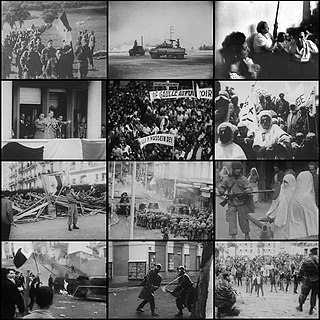
The Algerian War was a major armed conflict between France and the Algerian National Liberation Front (FLN) from 1954 to 1962, which led to Algeria winning its independence from France. An important decolonization war, it was a complex conflict characterized by guerrilla warfare and war crimes. The conflict also became a civil war between the different communities and within the communities. The war took place mainly on the territory of Algeria, with repercussions in metropolitan France.

French Algeria, also known as Colonial Algeria, was the period of Algerian history when the country was a colony and later an integral part of France.
The History of Algeria from 1962 to 1999 includes the period starting with preparations for independence and the aftermath of the independence war with France in the 1960s to the Civil War and the 1999 presidential election.
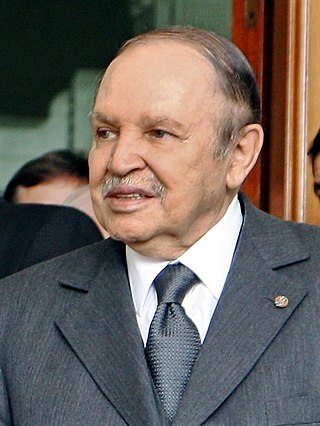
Abdelaziz Bouteflika was an Algerian politician and diplomat who served as the seventh president of Algeria from 1999 to his resignation in 2019.

The National Liberation Front commonly known by its French acronym FLN, is a nationalist political party in Algeria. It was the principal nationalist movement during the Algerian War and the sole legal and ruling political party of the Algerian state until other parties were legalised in 1989.

Ahmed Ben Bella was an Algerian politician, soldier and socialist revolutionary who served as the head of government of Algeria from 27 September 1962 to 15 September 1963 and then the first president of Algeria from 15 September 1963 to 19 June 1965.
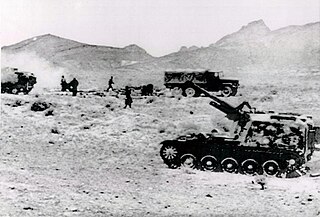
The Sand War was a border conflict between Algeria and Morocco fought from September 25 to October 30, 1963, although a formal peace treaty was not signed until February 20, 1964. It resulted largely from the Moroccan government's claim to portions of Algeria's Tindouf and Béchar provinces. The Sand War led to heightened tensions between the two countries for several decades.

Larbi Ben M'hidi, commonly known as Si Larbi or simply as Ben M'hidi, was a prominent Algerian revolutionary leader during the Algerian war of independence. He is one of the six founding members of the Front de Libération Nationale that launched an armed revolt throughout Algeria and issued a proclamation calling for a sovereign Algerian state.
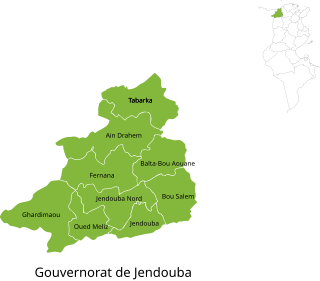
Jendouba Governorate is one of the twenty-four governorates of Tunisia. It is predominantly in the high hills of the Tell Atlas north-western Tunisia, bordering Algeria and the Mediterranean Sea. It covers an area of 3,102 km2 and has a population of 401,477. The capital is Jendouba.

Chabab Riadhi Belouizdad ; known as CR Belouizdad or simply CRB for short, is an Algerian association football club based in Algiers, Algeria, that plays in the Ligue Professionnelle 1, the top flight of Algerian football. The club has competed in the top division for a record 55 seasons.
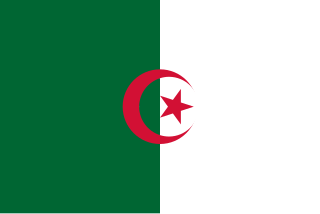
The Provisional Government of the Algerian Republic was the government-in-exile of the Algerian National Liberation Front (FLN) during the latter part of the Algerian War of Independence (1954–1962).

Benyoucef Benkhedda was an Algerian politician. He headed the third GPRA exile government of the National Liberation Front (FLN), acting as a leader during the Algerian War (1954–62). At the end of the war, he was briefly the de jure leader of the country, however he was quickly sidelined by more conservative figures.

In July 2001, President Abdelaziz Bouteflika became the first Algerian President to visit the White House since 1985. This visit, followed by a second meeting in November 2001, and President Bouteflika's participation at the June 2004 G8 Sea Island Summit, is indicative of the growing relationship between the United States and Algeria. Since the September 11 attacks in the United States, contacts in key areas of mutual concern, including law enforcement and counter-terrorism cooperation, have intensified. Algeria publicly condemned the terrorist attacks on the United States and has been strongly supportive of the Global War on Terrorism. The United States and Algeria consult closely on key international and regional issues. The pace and scope of senior-level visits has accelerated.

Algeria and the Tunisia are both predominantly Muslim nations in North Africa. Both countries have historic dynasties primarily focused in Algiers and Tunis that became specialized in piracy and global trade. Eventually these dynasties fell under the influence of the French in the 19th century. Both remained under French control until Tunisian independence became official in 1956 and Algeria became independent after the conclusion of the Algerian War in 1962. Since independence both countries have had periods of antagonism over issues such as border security and terrorism, however it appears that both countries are trending towards a positive relationship. The Algerian-Tunisian border is around 1034 km (642 mi) long and was officially agreed upon in 1960. Both countries are members of the African Union, Arab League, Organisation of Islamic Cooperation, Union for the Mediterranean and the United Nations.
Events from the year 2012 in Algeria

The 1965 Algerian coup d'état brought Colonel Houari Boumédiène to power as Chairman of the Revolutionary Council in Algeria. The bloodless coup d'état saw Algeria's first President, Ahmed Ben Bella, arrested and his closest supporters imprisoned by Boumédiène and his allies, principally in the Algerian Land Forces. The arrest of Ben Bella occurred on 19 June 1965.
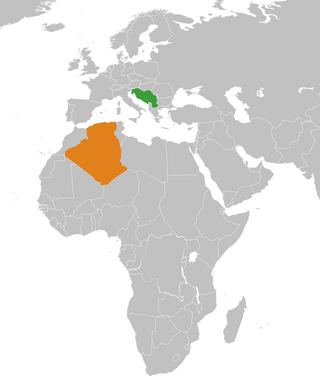
Algeria–Yugoslavia relations were historical foreign relations between Algeria and now split-up Socialist Federal Republic of Yugoslavia. Both countries self-identified with the wider Mediterranean region and shared membership in the Non-Aligned Movement. During the Algerian War Yugoslavia provided significant logistical and diplomatic support to the Algerian side which affected its intra-European relations with France. Yugoslavia was the first European country to openly support the FLN.